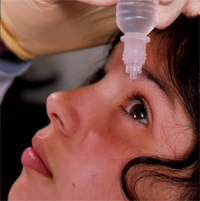Current treatments to slow the progression of myopia in children either don’t work or cause problematic side effects, according to a recent review published by pediatric eye doctors and study methodologists.

Of all methods of myopia inhibition, anti-muscarinic drops work the best, but their use is limited and causes side effects. Photo: National Eye Institute–National Institutes of Health
The reviewers analyzed data from 23 randomized controlled trials, which included a total of 4,696 participants. They considered a number of potential myopia treatments including bifocal glasses, eye drops, intraocular pressure-lowering drugs and contact lenses:
- Two studies investigated undercorrection of myopia.
- 12 studies investigated multifocal spectacles (progressive addition lenses [PALs] or bifocal spectacles).
- One study investigated bifocal soft contact lenses (BSCLs).
- Two studies investigated rigid gas permeable contact lenses (RGPCLs).
- Six studies investigated pharmaceutical eye drops (five of these were of anti-muscarinic medications).
- One study investigated new lenses designed to reduce peripheral hyperopic defocus (i.e., lenses that help to focus peripheral vision as well as central vision).
- One study evaluated both multifocal lenses and pharmaceutical eye drops.
The follow-up period was at least one year for all studies.
Of all the treatments, anti-muscarinic eye drops offered the largest positive effects for slowing myopia progression, the authors found, but they caused either light sensitivity or blurred near vision. Also, these drops are not yet commercially available, so their use is limited and impractical.
PALs and bifocal spectacles were found to yield a small slowing of myopia progression. RGPCLs were found to have no evidence of effect on myopic eye growth, while undercorrection of myopia was found to increase myopia progression slightly.
Lastly, “other methods of myopia control, such as the use of corneal reshaping contact lenses or bifocal soft contact lenses (BSCLs) with a distance center, are promising but currently no published randomized clinical trials exist,” the authors concluded.
An overview of the report is available at:
http://onlinelibrary.wiley.com/doi/10.1002/14651858.CD004916.pub3/pdf/abstract.
Walline JJ, Lindsley K, Vedula SS, et al. Interventions to slow progression of myopia in children. Cochrane Database Syst Rev. 2011 Dec 7;12:CD004916.

